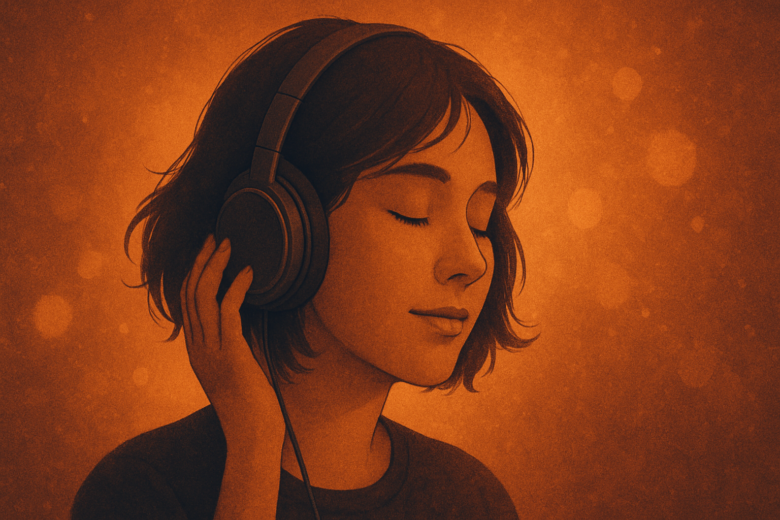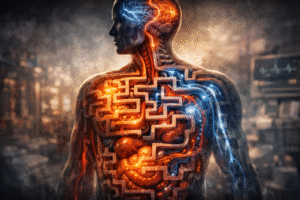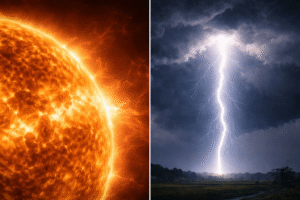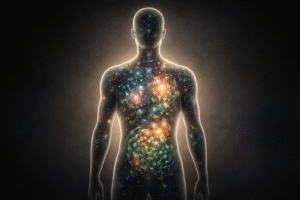Fun Fact: Roughly 55% of people report experiencing “frisson”—a scientific term for chills or goosebumps—while listening to music!
Why does a certain note in a song send a shiver down your spine? Why do you get goosebumps when a singer hits a high note or when the orchestra swells into a crescendo? These moments aren’t just poetic—they’re neurological. This isn’t just your imagination or some romantic quirk. Your brain is physically reacting to music as if it’s a matter of survival. Welcome to the strange science of music-induced chills—where melody meets biology.
Music, Meet Neuroscience: The Chills Are Real
Let’s start with the star of the show: frisson (pronounced “free-sawn”). This French word means “aesthetic chills” and describes a brief sensation of goosebumps, shivers, or a feeling of euphoria—commonly triggered by music.
Neurologically, frisson is a full-body phenomenon. When you experience a powerful musical moment, your brain floods your body with dopamine—the same chemical released during food, sex, or other pleasurable experiences. In fact, studies using fMRI (functional Magnetic Resonance Imaging) scans have shown that music activates the brain’s reward system, particularly the nucleus accumbens, amygdala, and prefrontal cortex.
In simple terms: Your brain lights up like it’s falling in love.
The Anatomy of a Shiver: What’s Actually Happening?
Here’s what happens when Adele hits a soul-piercing note or AR Rahman’s score hits that emotional climax:
- Unexpected Change: Your brain is constantly predicting what comes next in a song. When the music defies your expectations—say, an abrupt silence, a sudden key change, or a haunting vocal leap—it triggers a surprise.
- Emotional Appraisal: Your limbic system (which processes emotion) interprets that surprise and tags it with meaning—especially if you associate the song with a personal memory.
- Physiological Response: Your body reacts with a chill, raised hair follicles, and even a tear or two. It’s your nervous system firing up, releasing dopamine, and giving you a literal skin-deep experience of awe.
Why Some People Get Chills—And Others Don’t
Not everyone feels these musical goosebumps. Why?
According to a 2016 study from Harvard University, people who report frequent frisson have more nerve fibres connecting their auditory cortex (which processes sound) with emotional centres of the brain. This means their brains are physically more wired for emotional responses to music.
Also, your personality plays a role. People who score high in openness to experience—a trait that includes curiosity, imagination, and appreciation of art—are more likely to feel chills. So yes, your sensitivity to music may say something deeper about who you are.
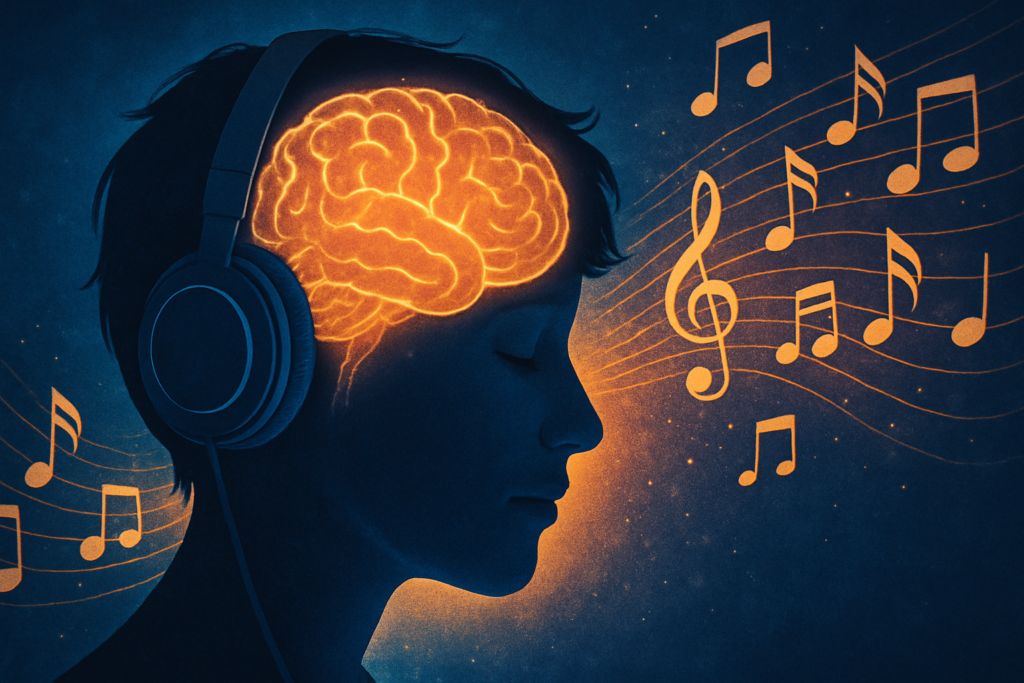
Case Study: The National Anthem Effect
Ever wondered why people cry or get goosebumps when a national anthem plays?
It’s not the notes—it’s what they represent. Songs tied to identity, grief, belonging, or triumph are more likely to provoke frisson. In a study by neuroscientist Dr. Valorie Salimpoor, even people who didn’t understand the lyrics of certain songs still experienced chills. The emotional architecture of the sound itself was enough.
The “Drop” That Hits Like a Drug
Let’s talk about EDM (Electronic Dance Music). That moment when the beat drops? It’s engineered to deliver a hit of dopamine. DJs often build anticipation through tempo, rhythm, and bass before releasing the tension with a satisfying boom—like a rollercoaster finally plunging downhill.
A 2021 study in Scientific Reports found that frisson was more likely to occur when listeners felt emotionally invested in the buildup. The longer the suspense, the bigger the dopamine reward when it resolves.
Music producers know this. They’re not just composing songs—they’re hacking your nervous system.
Your Brain Is Creating a Story
Interestingly, music activates not just your auditory cortex but also your default mode network—a set of brain regions involved in daydreaming, memory, and self-reflection.
When a song gives you chills, your brain isn’t just processing sound. It’s using the music to simulate emotion, generate mental imagery, and even relive personal memories. That’s why a breakup song from ten years ago can still bring you to tears—your brain stores it like a lived experience.
Why Sad Songs Hit Harder
Paradoxically, sad songs often produce the most chills. But why would something melancholy feel good?
Psychologists suggest it’s because music lets us experience sorrow without real-life consequences. It’s a safe sandbox for exploring grief, loss, or longing. And when the music resolves or rises after the sadness, it mirrors emotional resilience—giving your brain a tiny arc of hope and catharsis.
Think of it as emotional stretching. Pain followed by resolution can feel deeply satisfying—even healing.

Music as Emotional Training
Frisson is more than just a party trick. Some researchers believe it plays a role in emotional development. By practicing emotional responses through music, we may become more empathetic, more introspective, and more connected to the human experience.
It’s no wonder therapists use music as a healing tool. From Alzheimer’s patients regaining memory through melody to children with autism improving communication through rhythm—music’s ability to move us isn’t just poetic, it’s clinical.
Can You Train Your Brain to Feel More Chills?
Surprisingly, yes.
You can increase your chances of frisson by:
- Listening actively (not passively)
- Using headphones for immersive sound
- Closing your eyes to eliminate visual distractions
- Revisiting songs that have emotional memories
- Trying genres with dynamic range, like classical, gospel, film scores, or Indian ragas
You’re more likely to experience chills when you’re emotionally open, relaxed, and fully present with the music.
Conclusion: When Sound Becomes Soul
Music is more than entertainment. It’s a biological trigger, an emotional roadmap, a neurological puzzle that still leaves scientists guessing. When you get chills from a song, you’re experiencing one of the most complex and beautiful dances between brain, body, and soul.
So the next time a song gives you goosebumps, don’t just say “That’s a good track.” Say: “That’s my brain, in awe of art.”
Author’s Note
This blog was written to explore the intersection of music, memory, and the mind in a way that anyone can relate to. Music is personal—but its effects are universal. Whether you’re a scientist or a singer, frisson reminds us that we’re wired for wonder.
G.C., Ecosociosphere contributor.
References and Further Reading
- Salimpoor, V. N., et al. (2011). “Anatomically distinct dopamine release during anticipation and experience of peak emotion to music.” Nature Neuroscience.
- Sachs, M. E., et al. (2016). “Brain connectivity reflects human aesthetic responses to music.” Social Cognitive and Affective Neuroscience.
- https://www.ncbi.nlm.nih.gov/pmc/articles/PMC5004736/
- https://www.scientificamerican.com/article/why-does-music-give-you-chills/

